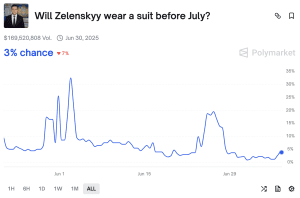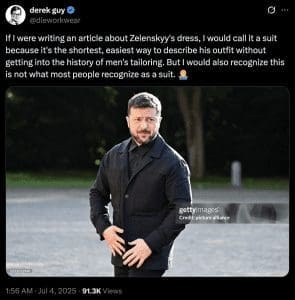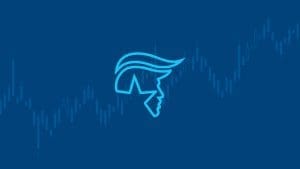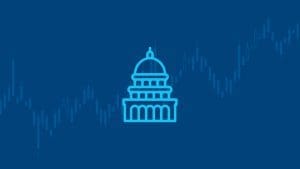Crypto platform Polymarket has proven that its market resolutions don’t occur in a “free” market.
The prediction market platform offered a market on whether Ukrainian president, Volodymyr Zelenskyy, would wear a suit before July. Polymarket launched it after the Oval Office confrontation where Trump, in addition to calling Zelenskyy a dictator, criticized him for not wearing a suit. Zelenskyy wore a suit designed to incorporate military-style dress at the NATO summit on June 24. Market odds rose from about 4% to just under 20%.
However, the market is on track to resolve to “No”. Polymarket uses a UMA Oracle to resolve its markets. In this system, traders who hold UMA tokens vote on whether an event occurred. However, traders with more UMA tokens get more votes, giving these “whales” the ability to resolve controversial markets in their favor.

UMA whales have already hijacked Polymarket’s markets on:
- Whether Ukraine would agree to Trump’s rare minerals deal by April 2025
- Whether Israel would invade Lebanon in September 2024
- Whether Israel would invade Syria by December 2024
Polymarket’s ongoing UMA controversies stem from a faulty reliance on what constitutes a “free” market.
Unfree markets and bad game theory
UMA Oracle, Polymarket’s resolution service, states on its homepage that “As the game theory would predict, disputes are rare in practice because the incentives are always to be honest.” However, game theory describes how people should behave to reach a shared goal, not how people behave in practice.
UMA Oracle discounted the incentives to acquire many UMA tokens, which can be bought on cryptocurrency exchanges, to manipulate market outcomes for personal benefit. An X account active in the crypto prediction market space posted a screenshot of a Polymarket whale admitting they were trying to resolve the Zelenskyy suit market in their favor:
They’re not even hiding it anymore.
“It doesn’t matter about the suit. We have more UMA tokens. Force it through.”Whales openly brag about overriding truth with money@Polymarket @UMAprotocol you must do something
40% of UMA tokens are in the hands of just two people.
Do you… https://t.co/k09qL5KrXy pic.twitter.com/MXJZPIa1MA— Atlantis liquidity (@Atlantislq) July 7, 2025
Etherscan shows that 54% of UMA voting tokens are held by two traders. Since Polymarket’s resolution process depends so heavily on a few traders, the resolution operates like an oligopoly with a few wealthy traders deciding market resolutions instead of a competitive free market where an outcome truly reflects the group’s beliefs.
As Dustin Gouker pointed out in a Substack post, the Polymarket resolution criteria in this case failed to clearly define what would constitute a “suit” for the market to resolve as ‘Yes.’ Menswear expert “derek guy” on X weighed in on the controversy in a Twitter thread, confirming that whether the outfit would be considered a “suit” or not is debatable.

Third-party resolution done better
In contrast to Polymarket’s oligopic resolution process, CFTC-regulated prediction market Kalshi lists the third-party sources it uses to resolve its markets ahead of time. Kalshi has consistently had less controversial market resolutions than Polymarket because of Kalshi’s better clarity of resolution terms.
For example, Kalshi’s market on whether the United States would ban TikTok linked to the Library of Congress where the outcome of the ban would be verified, eliminating the reliance on wealthy traders to decide how a market should be settled. In contrast, for the same market, Polymarket wrote:
“The primary resolution source for this market will be information from the US federal government, however a consensus of credible reporting will also be used.”
While Polymarket and Kalshi arrived at the same conclusion in that case, Polymarket went through two rounds of disputes over whether the Supreme Court’s ruling upholding the TikTok ban went into effect on Jan. 19, 2025. Kalshi didn’t, though the ban’s short duration made the market on both platforms controversial.
As Polymarket continues to struggle with UMA whales, the controversy can help Kalshi position itself as a more reliable prediction market. Polymarket’s existence outside of U.S. jurisdiction may allow it to offer markets that Kalshi can’t, like the odds of war or a military invasion. However, offering markets on a few taboo topics many participants are interested in trading on can’t save Polymarket from the reputational damage that comes with continued UMA resolution scandals.


























